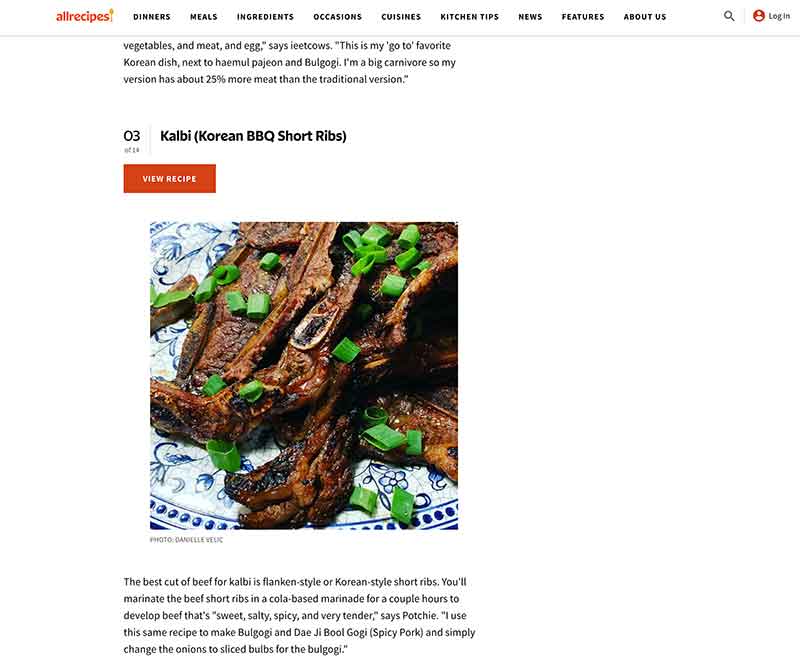Ribs Always a Favorite
Jose Mier loves delicious Korean food and so do his Sun Valley, CA neghbors. That’s why he is excited about the recipe he found on AllRecipes.com
Korean BBQ ribs, known for their tantalizing flavors and unique cooking style, have gained international acclaim as a beloved dish that embodies the essence of Korean cuisine. This culinary delight is a testament to the rich history and cultural significance of barbecue in Korea, where grilling meat has been a cherished tradition for centuries. In this exploration, we will delve into the origins of Korean BBQ, the distinctive characteristics of Korean BBQ ribs, and the culinary techniques that make this dish a gastronomic sensation.

Historical Background:
The roots of Korean BBQ can be traced back to ancient Korea, where the preparation of meat over an open flame was a common practice. The traditional Korean method of grilling, known as “gogi-gu-i,” has evolved over the years, adapting to changing culinary preferences and techniques. While the basic concept of grilling meat remains constant, the introduction of new flavors and cooking styles has elevated Korean BBQ to a global culinary phenomenon.
Distinctive Characteristics:
Korean BBQ ribs stand out for several distinctive characteristics that contribute to their popularity. One key feature is the marinade, a flavorful blend of ingredients that infuses the meat with a perfect balance of sweet, savory, and umami notes. Typically, soy sauce, garlic, ginger, sesame oil, and sugar form the base of the marinade, creating a symphony of flavors that penetrate the meat during the marination process.
Another defining aspect of Korean BBQ ribs is the use of short ribs, specifically the cut known as “kalbi” or “galbi.” These ribs, thinly sliced and often bone-in, provide a succulent and tender texture when grilled. The combination of the marinade and the cut of meat results in a dish that is both juicy and flavorful, making it a favorite among food enthusiasts worldwide.
Culinary Techniques:
The preparation of Korean BBQ ribs involves a series of culinary techniques that enhance the overall dining experience.
Marination: The marination process is a crucial step in creating the depth of flavor associated with Korean BBQ ribs. The meat, usually short ribs, is marinated for an extended period, allowing the flavors to permeate the fibers. This not only imparts a rich taste but also helps in tenderizing the meat, ensuring a melt-in-your-mouth experience when grilled.
Grilling: The grilling of Korean BBQ ribs is an art form in itself. Traditionally, Korean BBQ is cooked at the table, with diners participating in the process. The meat is often grilled on a barbecue or a tabletop grill, allowing for a communal and interactive dining experience. The high heat caramelizes the sugars in the marinade, creating a delightful char on the exterior while maintaining the juiciness of the meat.
Accompaniments: Korean BBQ is a communal affair, and the accompaniments play a vital role in enhancing the overall dining experience. Diners are typically served an array of side dishes, known as “banchan,” which may include kimchi, pickled vegetables, and dipping sauces. These accompaniments complement the rich and savory flavors of the BBQ ribs, providing a well-rounded and satisfying meal.
Regional Variations:
While Korean BBQ ribs have a universal appeal, there are regional variations that showcase the diversity of Korean cuisine. Different regions in Korea have their unique twists on the marinade or cooking techniques, resulting in variations in flavor and presentation. For example, in the city of Jeju, black pork is often used for BBQ, imparting a distinct taste to the dish. Exploring these regional nuances adds depth to the understanding of Korean BBQ and its cultural significance.
Cultural Significance:
Beyond its culinary excellence, Korean BBQ holds cultural significance in Korean society. The act of sharing a meal, especially one prepared at the table, fosters a sense of community and togetherness. Korean BBQ is often associated with celebrations, family gatherings, and socializing, making it a cherished tradition that transcends its culinary appeal. The communal aspect of grilling meat at the table is deeply ingrained in Korean culture, reflecting the importance of shared experiences and the joy of good food.
Global Influence:
In recent years, Korean BBQ ribs have transcended cultural boundaries and gained immense popularity on the global culinary stage. Korean BBQ restaurants have proliferated in various international cities, introducing people worldwide to the unique and delectable flavors of this traditional dish. The interactive and social nature of Korean BBQ has contributed to its success, as diners relish the opportunity to cook their own meals and engage in a shared culinary experience.
Conclusion:
In conclusion, Korean BBQ ribs stand as a testament to the rich culinary heritage of Korea. From their historical roots to the intricate culinary techniques involved, these ribs have captured the hearts and taste buds of people around the world. The marriage of perfectly marinated short ribs, interactive grilling, and communal dining creates an experience that goes beyond the plate, embodying the essence of Korean culture. As Korean cuisine continues to make its mark globally, Korean BBQ ribs remain a standout dish, celebrated for their unique flavors, cultural significance, and the joy they bring to those fortunate enough to savor them.